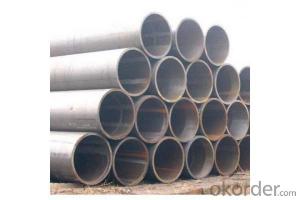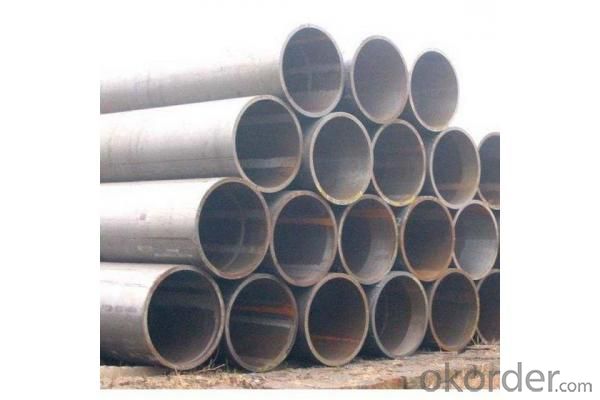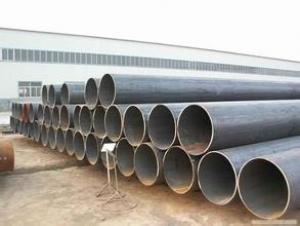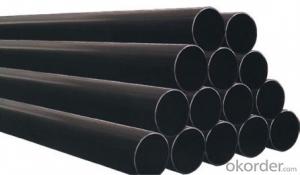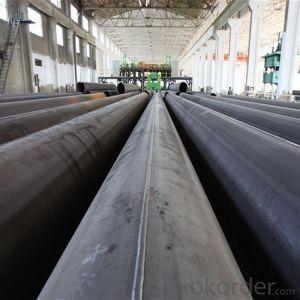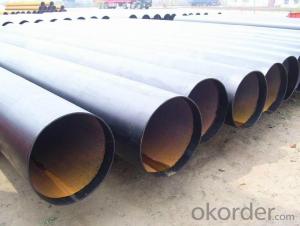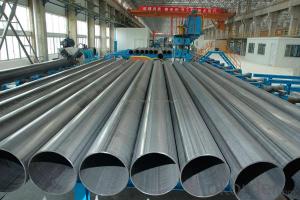20'' CARBON STEEL LSAW WELDED PIPE API/ASTM/JIS/DIN
- Loading Port:
- Tianjin
- Payment Terms:
- TT OR LC
- Min Order Qty:
- 5 m.t
- Supply Capability:
- 300 m.t/month
OKorder Service Pledge
OKorder Financial Service
You Might Also Like
Packaging & Delivery
Packaging Detail: | standard export packing or as customer's requirement |
Delivery Detail: | within 10 - 30 days |
Specifications
Spiral Welded Steel Pipes and Tubes
1.Material:Q195-Q235
2.Length:1-12m
3.WT:1.0-14mm
4.O.D.:20-273mm
Product Description:
1.Material : Q235,Q345,L245,L290,L360,L415,L450,L485,GrB,X42,46,X52,X56,X60,X65,X70,X80,X100
2,Standard: SY/T5037-2000,GB/T9711-2011,API Spec 5L PSL1/PSL2,ASTM A252\A53,ISO3183,DIN17172,EN10217,JIS G3457,AWWA C200,ASTM A139,ASTM A671,ASTM A672
3.Wall thickness: 3.0mm-30mm
4.Outer diameter: φ168mm-3020mm
5,Length: 5m-12m or as your requirement
6,Corrosion protection standard: DIN30670,DIN30671, AWWAC210, AWWA C203, SY/T0413-2002,SY/T0414-2002
7,Application: Oil, gas, natural gas, water pipe, thermal electricity pipe, steel structure engineering, etc
Q195-q345 Material Steel Pipe's Materials
Elements | Chemical Compsition% | Mechanical Property | ||||||
C% | Mn% | S% | P% | Si% | Yield Point (Mpa) | Tensile Strength(Mpa) | Elongation | |
Q195 | 0.06-0.12 | 0.25-0.50 | <0.050< span=""> | <0.045< span=""> | <0.030< span=""> | >195 | 315-430 | 32-33 |
Q215 | 0.09-0.15 | 0.25-0.55 | <0.05< span=""> | <0.045< span=""> | <0.030< span=""> | >215 | 335-450 | 26-31 |
Q235 | 0.12-0.20 | 0.30-0.70 | <0.045< span=""> | <0.045< span=""> | <0.030< span=""> | >235 | 375-500 | 24-26 |
Q345 | <0.20< span=""> | 1.0-1.6 | <0.040< span=""> | <0.040< span=""> | <0.55< span=""> | >345 | 470-630 | 21-22 |
Packaging & Delivery
Packaging Detail: | Normal exporting packing,in container or bulk vessel or as per clients' request |
Delivery Detail: | 2 months after confimed contract |
Specifications
Large Diameter API 5L X70 PSL2 LSAW Steel Pipe
Grade: X42, X46, X50, X52, X60, B, C
OD: 1.5"-28"
WT: SCH10-SCH160
Brand:TPCO
Large Diameter API 5L X70 PSL2 LSAW Steel Pipe
Specifications:
u Standard: API 5L
u Grade: B, C, X42, X46, X50, X52, X56, X60, X65, X70, X80
u OD: 1.5"-28"
u WT: SCH10-SCH160
u Length: 5-12m
u Ends Finish: plain end, bevel end, grooved end
u Surface Treatment: bare, black varnished, oiled finish, red color, anti-corrosion, 3PE, FBE or epoxy coating
u Technique: hot rolled or cold drawn
u Application: api 5l steel pipe for conveying oil, water, gas
u Invoicing: based on theoretical weight or actual weight
u Payment Terms: L/C at sight, T/T or Western Union
u Trade Terms: FOB, CFR, CIF
u Certification: ABS manufacturing assessment, ABS design assessment, API 5CT, API 5L, DNV manufacturer certificate, ISO9001 quality management system certificate, ISO14001 environment management system certificate, GB/T28001 occupational health and safety management system certificate, A1 class manufacturing license of special equipment certificate, CCS, GL, LR, SGS, TüV, PDE
- Q: Can steel pipes be used for underground oil pipelines?
- Yes, steel pipes can be used for underground oil pipelines. Steel pipes are commonly used for this purpose due to their strength, durability, and resistance to corrosion. They are capable of withstanding the high pressure and extreme conditions associated with oil transportation underground.
- Q: What is the standard length of a steel pipe?
- The industry and application dictate the standard length of a steel pipe, which can vary. In general, steel pipes typically range from 18 to 24 feet in length. These lengths find common usage in construction, plumbing, and various industrial applications. It is worth mentioning that custom lengths are also available to accommodate specific project needs.
- Q: How are steel pipes marked for identification and traceability?
- Steel pipes are marked for identification and traceability through various methods. One common method is through the use of permanent markers or paint. These marks typically include important information such as the manufacturer's name or logo, the pipe's size and specifications, and the production date or batch number. In addition to surface marking, steel pipes may also be identified using tags or labels. These tags are usually made of durable materials such as metal or plastic and are securely attached to the pipe. They contain detailed information about the pipe, including its unique identification number, material composition, and any relevant certifications or standards it meets. Another method used for identification and traceability is the application of barcodes or QR codes. These codes can be scanned using specialized equipment or mobile applications, providing instant access to comprehensive information about the pipe's origin, production process, and quality control measures. Barcodes and QR codes offer a more efficient and automated way of tracking and tracing steel pipes throughout their lifecycle. Furthermore, some steel pipes may have embossed or engraved markings directly on their surface. These markings are typically indented into the metal and can withstand harsh conditions, ensuring long-term visibility and legibility. The goal of marking steel pipes is to ensure their proper identification and traceability throughout their lifecycle. This helps in quality control, maintenance, and inspection processes, as well as in ensuring compliance with regulatory requirements. By having clear and permanent markings, manufacturers, suppliers, and users can easily track and trace the history and specifications of steel pipes, enabling better management and accountability in various industries such as construction, oil and gas, and infrastructure development.
- Q: Is the PVC tube a plastic tube or a plastic tube?.
- PVC is actually a vinyl polymerization substance, whose material is a non crystalline material. Polyvinyl chloride (Poly, Vinyl, Chloride, PVC), it is obviously impossible to steel, we often say that iron and steel, the steel must be the main component of iron, Fe, inorganic. And PVC, polyvinyl chloride, is an organic substance. Therefore, PVC can not be called steel, and PVC constitutes a large number of substances, not confined to the pipe type.
- Q: Can steel pipes be used for conveying sewage and wastewater?
- Yes, steel pipes can be used for conveying sewage and wastewater. Steel pipes are commonly used in sewage and wastewater systems due to their durability and strength. They are resistant to corrosion and can withstand high pressure and flow rates. Additionally, steel pipes are able to handle the harsh chemicals and contaminants present in sewage and wastewater without deteriorating or affecting the quality of the conveyed fluids. However, it is important to ensure that the steel pipes are properly coated or lined to prevent any potential corrosion or contamination issues. Regular maintenance and inspections are also necessary to identify and address any potential issues that could arise in the system.
- Q: What is the minimum wall thickness for steel pipes?
- The minimum wall thickness of steel pipes varies depending on different factors, including the pipe's intended use and the specific industry standards and regulations. Determining the minimum wall thickness generally involves considering factors like the pipe's diameter, material strength, and the pressure or load it will experience during operation. In the oil and gas industry, for instance, the minimum wall thickness for steel pipes is typically specified by industry standards such as API 5L or ASME B31.3. These standards take into account elements such as the pipe's diameter, the material's yield strength, and the maximum pressure it will encounter. In other applications, such as structural or mechanical engineering, the minimum wall thickness for steel pipes is determined by factors like the pipe's intended load-bearing capacity, the desired safety factor, and any relevant building codes or regulations. To establish the specific minimum wall thickness requirements for steel pipes in a particular application, it is essential to consult the appropriate industry standards, codes, or regulations.
- Q: Can steel pipes be used for stormwater management systems?
- Yes, steel pipes can be used for stormwater management systems. Steel pipes are a commonly used material for stormwater management due to their durability, strength, and resistance to corrosion. They can effectively carry and transport stormwater, making them suitable for various applications in stormwater management systems.
- Q: How are steel pipes used in the construction of underground parking garages?
- Steel pipes are used in the construction of underground parking garages for various purposes, including providing structural support, serving as conduits for utilities such as water and electricity, and facilitating drainage systems. They are often used as deep foundation elements to support the weight of the structure and the vehicles above. Additionally, steel pipes are commonly used for installing fire suppression systems, ventilation systems, and plumbing connections within the parking garage.
- Q: Can steel pipes be used for power plant construction?
- Steel pipes are indeed suitable for power plant construction. They find wide usage in power plants for multiple purposes, including steam, water, and air/gas piping. Their strength, durability, and capacity to endure high temperatures and pressures make them highly recommended. Moreover, steel pipes possess exceptional resistance to corrosion, a crucial factor in power plant settings where various fluids and gases are transported. Furthermore, their easy weldability permits efficient installation and maintenance. In conclusion, steel pipes emerge as a dependable and economical option for constructing power plants.
- Q: How do steel pipes perform in high-temperature applications?
- Steel pipes perform well in high-temperature applications due to their excellent heat resistance and structural integrity. The high melting point of steel allows it to withstand extreme temperatures without deformation or failure. Additionally, steel pipes have good thermal conductivity, which ensures efficient heat transfer in industrial processes.
Send your message to us
20'' CARBON STEEL LSAW WELDED PIPE API/ASTM/JIS/DIN
- Loading Port:
- Tianjin
- Payment Terms:
- TT OR LC
- Min Order Qty:
- 5 m.t
- Supply Capability:
- 300 m.t/month
OKorder Service Pledge
OKorder Financial Service
Similar products
Hot products
Hot Searches
Related keywords
